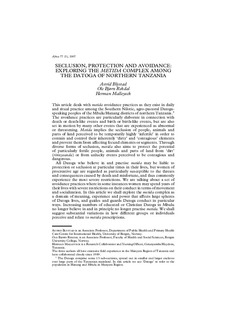Seclusion, protection and avoidance : exploring the metida complex among Datoga of Northern Tanzania
Peer reviewed, Journal article

Åpne
Permanent lenke
http://hdl.handle.net/11250/2481689Utgivelsesdato
2007-08Metadata
Vis full innførselSamlinger
Sammendrag
This article deals with metida avoidance practices as they emerge in daily and ritual practice among the agro-pastoral Datoga-speaking peoples of Tanzania. The elaboration of the avoidance practices varies starkly between and within Datoga segments, but these practices are commonly particularly elaborate in connection with death or death-like events, and with birth or birth-like events. In the study area women may spend years of their lives with severe restrictions on their conduct in terms of movement and socialization. We argue that in making sense of such avoidance phenomena the strong influence of Mary Douglas's ‘dirt’ and ‘pollution’ concepts has hindered an understanding of the fact that the metida seclusion does not only isolate substances perceived to be dangerously contaminating, but in similar ways secludes fertile and vulnerable elements in order to protect them. A Strathern-inspired transition to a focus on bodies as open and dynamic systems that mingle with other bodies in intimate flows or exchanges of bodily fluids may be fruitful in this context. We indicate, however, that incautious substitution of a ‘pollution’ concept with the concept of 'flows' may lead to challenges not entirely dissimilar to those that attended the employment of Douglas's concepts. [ABSTRACT FROM AUTHOR]
Utgiver
Edinburg University PressSerie
AfricaVol.77 2007 No 3